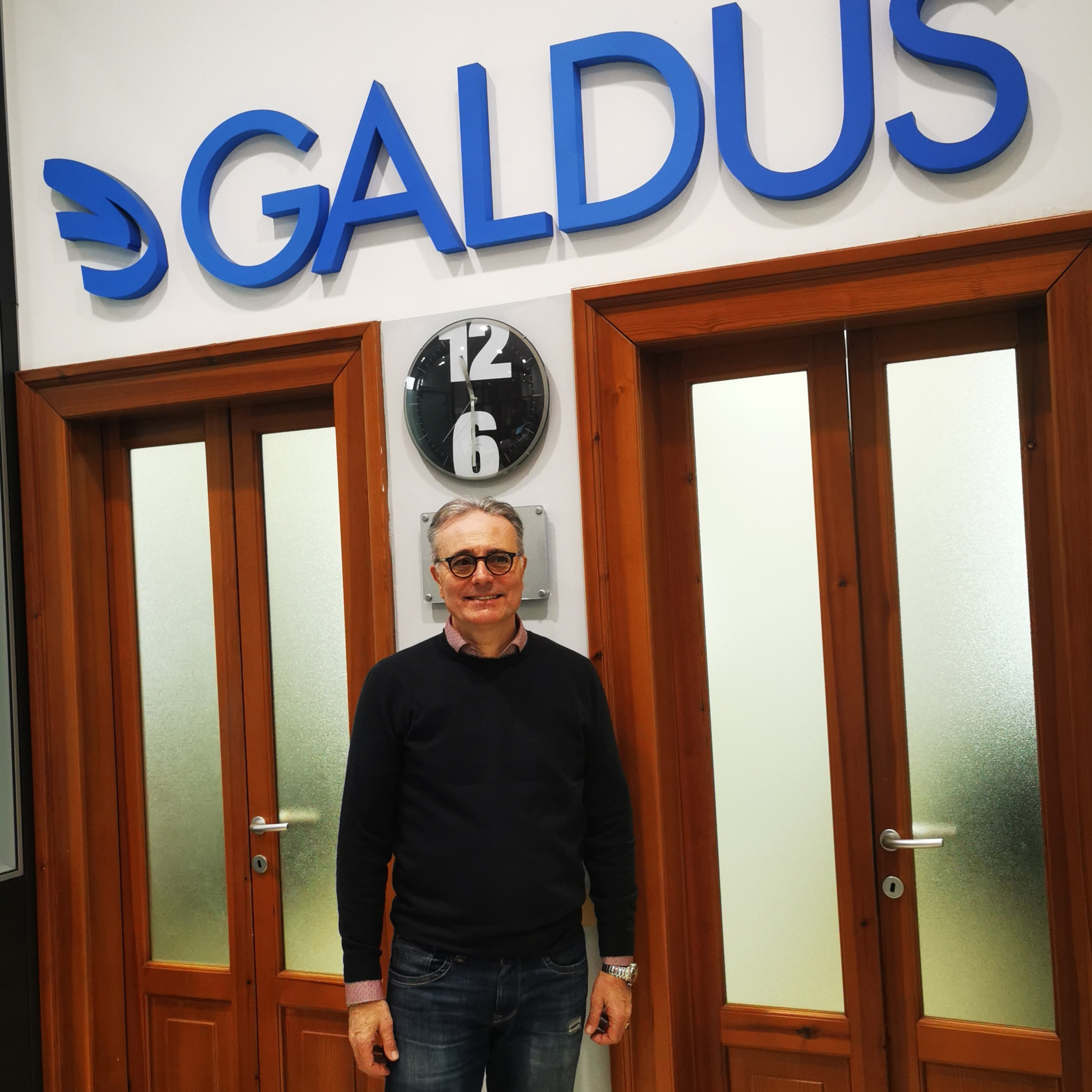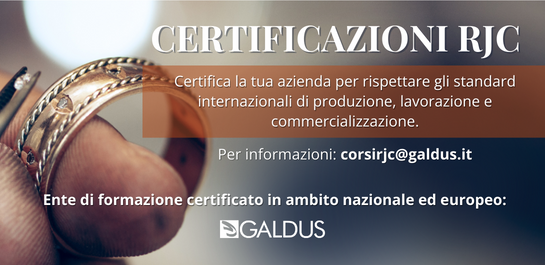
Etica e formazione: Galdus in prima linea con i corsi RJC
Bruno Spinazzè: “I corsi RJC consentono alle aziende di allinearsi agli standard di produzione, lavorazione e commercializzazione. L’Italia giorno dopo giorno sta scoprendo la loro importanza“.
Galdus, ente di formazione riconosciuto e certificato in ambito nazionale ed europeo, è sensibile ai temi dell’etica e delle buone pratiche in ambito sicurezza del lavoro. Se ne occupa sia come struttura formativa, sia come supporto e consulenza per le aziende. Nei primi giorni di aprile 2024, partiranno le offerte formative orientate alle necessità aziendali, in particolare del settore orafo-gioielliero. “Abbiamo deciso di avviare i corsi dopo aver contattato gli enti di riferimento più conosciuti. Il progetto, dunque, è stato preceduto da un nostro approfondimento con Intertek e Bureau Veritas – dice Bruno Spinazzè, project manager corsi RJC per Galdus – Nello specifico, i corsi RJC consentono alle aziende di allinearsi agli standard di produzione, lavorazione e commercializzazione. Seguono, dunque, tutta la filiera, fino alla consegna del prodotto nelle mani del cliente. Illustreremo alle aziende i motivi per i quali sono nati i corsi RJC. Sono stati avviati su scala internazionale e l’Italia giorno dopo giorno sta scoprendo la loro importanza: li richiedono i grandi brand, che a propria volta sono già certificati e dunque vogliono dai propri associati una tracciatura etica di tutti i passaggi produttivi, insomma una garanzia della solidità dell’azienda”.

Il percorso formativo si svolge on line con slot da 8 ore ciascuno, per un totale di 3 corsi. Ciascuna azienda può scegliere anche di seguire un modulo di riferimento anziché un altro. “Il primo modulo – dice Spinazzè – avrà una metodologia di spiegazione dell’aspetto più burocratico della certificazione. Poi passeremo a COP e COC, acronimi di Code of Practices e Chain of Custody. Nel primo caso, parliamo di pratica di lavorazione, che tiene conto della prassi, della tutela dei lavoratori e dell’aspetto sociale con particolare riferimento alla lavorazione del diamante, dell’oro, dell’argento, platino e gemme. È una certificazione obbligatoria, richiesta da tutte le aziende. Nel caso della COC, invece, si parla dell’approvvigionamento responsabile con un excursus sull’estrazione della materia prima e sul viaggio che il prodotto fa, fino ad arrivare al dettagliante ed al consumatore. Il percorso formativo continua con un’affermazione tecnica negli ambienti che l’azienda utilizza: dal controllo dei lavoratori al sistema utilizzato, fino alla gestione degli spazi. L’azienda ha poi l’obbligo di una check list per registrare la filiera del prodotto, da quando entra per essere lavorato fino a quando ritorna al brand per essere commercializzato. In questo modo il consumatore finale può sapere da che parte arrivino le pietre e il metallo, come sono stati lavorati e in che modo siano commercializzati. Il settore orafo-gioielliero è tra i più virtuosi e fortunati, perché Responsible Jewellery Council è un sistema rodato, consolidato negli anni. L’ultimo modulo del corso viene svolto con l’aiuto di un Ente esterno, che fa supervisione nell’azienda e garantisce che siano stati osservati i requisiti generali. Controlla, dunque, che l’azienda applichi effettivamente tutto ciò che dichiara. Si arriva, quindi, al pre-assessment, una preparazione all’esame attraverso la quale certifichiamo che le aziende abbiano partecipato a più step. In questa ultima fase del nostro percorso subentra un consulente finale, l’esaminatore. In seguito, l’azienda decide se affidarsi al professionista Galdus oppure ad un altro Ente certificatore. Galdus dà lo strumento e certifica che il corso sia stato svolto seguendo una determinata prassi, ma ovviamente non obbliga a seguire il proprio percorso anche nella fase successiva. Il sistema di certificazione serve soprattutto all’utente finale, perché avvicina sempre più il consumatore al nostro settore, dandogli un quadro di assoluta trasparenza”

Le aziende interessate possono visitare il sito internet www.galdus.it nel quale è stata creata un’area dedicata, “la certificazione RJC”, che offre le varie proposte. Ci sono tutte le informazioni utili all’iscrizione e anche le Faq. È stato creato un indirizzo e-mail dedicato: corsirjc@galdus.it
Ethics and education: Galdus leads the way with RJC courses
Galdus, a recognised and certified training organisation at national and European level, is sensitive to the issues of ethics and good practices in the field of occupational safety. It deals with this both as a training facility and as support and consultancy for companies.
In the first days of April 2024, training offerings geared to the needs of companies, particularly in the gold and jewellery sector, will start. “We decided to start the courses after contacting the most well-known reference organisations. The project, therefore, was preceded by our in-depth study with Intertek and Bureau Veritas,’ says Bruno Spinazzè, RJC course project manager for Galdus. ‘Specifically, RJC courses enable companies to align themselves to production, processing and marketing standards. They therefore follow the entire supply chain, right up to the delivery of the product into the hands of the customer. We will explain to companies why RJC courses came into being. They have been launched on an international scale and Italy is discovering their importance day by day: the big brands are demanding them, which in turn are already certified and therefore want from their members an ethical tracking of all production steps, in short a guarantee of the solidity of the company.
The training takes place online with slots of 8 hours each, for a total of 3 courses. Each company can also choose to follow one module instead of another. “The first module,’ says Spinazzè, ‘will have a methodology explaining the more bureaucratic aspect of certification. Then we will move on to COP and COC, acronyms for Code of Practices and Chain of Custody. In the first case, we talk about processing practice, which takes into account practice, worker protection and the social aspect with particular reference to the processing of diamond, gold, silver, platinum and gemstones. It is a mandatory certification required by all companies. In the case of the COC, on the other hand, responsible sourcing is discussed with an excursus on the extraction of the raw material and the journey that the product makes, all the way to the retailer and the consumer. The training course continues with a technical statement on the environments the company uses: from the control of workers to the system used and the management of spaces. The company then has a check list to record the product’s supply chain, from when it enters to be processed until it returns to the brand to be marketed.The last module of the course is carried out with the help of an external body, which supervises the company and ensures that the general requirements have been observed. It checks, therefore, that the company actually applies everything it declares. This leads to the pre-assessment, a preparation for the examination through which we certify that companies have participated in several steps. In this last stage of our process, a final consultant, the examiner, takes over. The company then decides whether to rely on the Galdus professional or on another certifying body. Galdus gives the tool and certifies that the course has been carried out following a certain practice, but of course does not oblige to follow the course in the next phase. The certification system serves above all the end user, because it brings the consumer closer to our sector, giving him a picture of absolute transparency”.
Interested companies can visit the website www.galdus.it in which a dedicated area, ‘RJC certification’, has been created, offering the various proposals. There is all the information needed for registration and also Faqs. A dedicated e-mail address has been created: corsirjc@galdus.it


POST COMMENT
Devi essere connesso per inviare un commento.